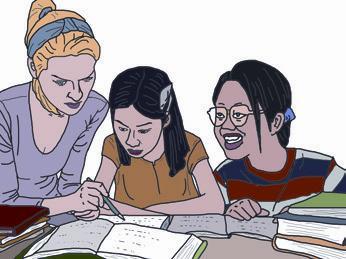Teaching in China
By Natasha Lock
Educational systems vary from country to country and culture to culture; the educational means with which we teach the next generation have arguably one of the greatest sociological influences on culture as a whole. Nowhere is this infl uence on societal structures more obvious than on the contemporary generation of youth in China.
Education has played a vital role in Chinas history since ancient times. To name but a few landmarks in the history of education in China, for example, Confucian teachings; the Tang Dynasty (618-907) imperial civil service examination; and also the imperial college started in the third century. Despite dualities in the concepts of education, a constant from ancient to contemporary times is the interrelationship between learning and societal development.
Spending nine months as a teacher at Suzhou No.10 High School in Jiangsu Province, east China, provided an exceptionally interesting lens through which to understand the dynamics of the current Chinese schooling system. For students who, on the whole, had seldom left the country and spent most of their time at school, they had some incredibly wise perspectives on the world. It was such a pleasure hearing about these outlooks and reconsidering my own views on things because of them.
Teaching students in China has been a real privilege, and whilst I am employed to teach, I also learn a great deal from them. Leaving school every day after work and knowing that Ive made a direct difference to someones day is extremely fulfi lling and rewarding.
While teaching in Suzhou, I came to realize that the secondary education system in China is extremely competitive, examfocused and rigid in terms of marking rules. Every student in every class knew their academic strengths and weaknesses. They knew exactly where they ranked in terms of their maths results in the class and they all knew who was slacking on their physics scores. The students arrived for their first class at 7:30 a.m. and, whilst school officially finished at 5 p.m., many would stay till much later to complete their heavy load of homework. They were used to complex maths exams, English grammar quizzes and tests on history.
They were therefore quite shocked when I assigned them a task that analyzed their personality and gave results on their character strengths. This was fascinating for them as they discovered things about themselves that they had never even considered before.
As I kept telling them, they will be the next generation of doctors, teachers, lawyers, soldiers and athletes. Whilst a doctor may need to flourish academically in the sciences, it is also imperative they are empathetic, socially approachable and humble. Extra-curricular activities in the fundamental childhood and teenage years nurture these character strengths; sport builds tenacity and resilience; a parttime job develops team-work skills and problem-solving; leisure time with friends from a young age builds social skills.
Deng Xiaopings famed analogy seems pertinent to contemporary education: It doesnt matter if a cat is black or white so long as it catches mice. Much like education systems, countries and cultures differ. So long as we are heading along the same path of academic understanding and addressing some of the complexities facing the world today, what does it matter? But we are yet to find faultless methods of education; the optimum balance of social nourishment and academic training. When I posed these and similar queries to my students, they suggested merging aspects of typical Western education with aspects of Chinese education.

